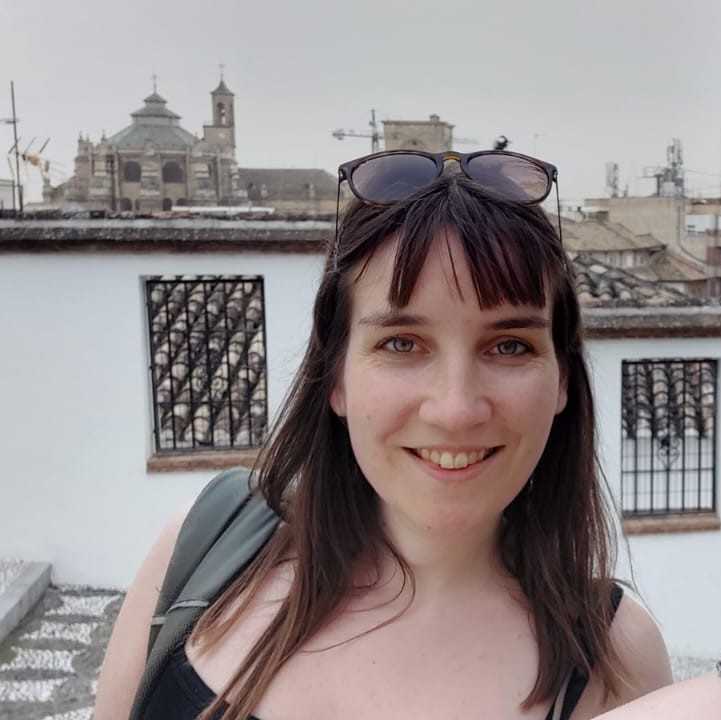Deborah Biging
Deborah Biging completed her master's thesis "Educational Justice in Response to Oppression by Heteronormative Schools" in August 2022.

Impressed by the commitment of philosophers to pursue a line of thought to the bitter end
I still remember my first contact with philosophy: as a thirteen-year-old, I came across a philosophy book for beginners in the local library. It explained various philosophical questions and problems, often in the form of puzzles or dilemmas. This book was my first introduction to philosophical thinking with its characteristic back-and-forth of hypothesis and objections in continuous deliberation with sometimes surprising results. I remember being extremely fascinated by this approach to problems and enjoying thinking through all the complexities of the issues and realizing that there is often no obvious or convincing answer. I was impressed by the commitment of philosophers to pursue a line of thought to the bitter end and not to shy away from counter-intuitive results and to defend sometimes radical positions that common sense would immediately reject.
A few years later, when I had to decide what I wanted to study, I remembered this inital fascination. I have always enjoyed debating and hoped that studying philosophy would sharpen my analytical thinking and train me to gain an overview of political and ethical debates. My interest in social discourse was also very lively when I was a teenager. For this reason, it was no surprise that I found myself increasingly attending political philosophy seminars. I also found courses in theoretical philosophy interesting, but for me this was more of an exercise in mental gymnastics, as I was usually not emotionally committed to a particular solution to the problems. In the field of political philosophy, on the other hand, I always had extremely strong intuitions and was very motivated to invest a lot of time and energy in defending them. This probably also gave me the energy to continue on the path of academic philosophy, as I am currently in my doctoral studies.
During my studies, I worked as a student assistant at the Department of Practical Philosophy and was also able to learn a lot in this role, gaining valuable insights into everyday university life and making contacts. I would particularly advise people who are considering a career at university to seize such an opportunity if it presents itself. During my studies, I also did yoga (and worked as a yoga teacher), improved my language skills (in addition to English, which is indispensable for PELP studies and academic philosophy in general, I also learned French and Portuguese) and spent a semester in Portugal at the University of Coimbra. It was easy to combine my studies with these additional activities and even though this delayed my progress, I benefited greatly from enriching my academic activities with these additional experiences.
It was not easy for me to pick a Master's thesis topic. There were so many questions that interested me. In the end, I decided on a topic that affected me in an intimate way and I wrote my Master's thesis on heteronormativity and educational equality. I knew as a teenager that I was bisexual, but didn't dare to admit it until I was an adult. I wanted to find out why it is still so difficult for queer people to admit their identity in our society, which likes to see itself as liberal, and what we are obliged to do about it in the interests of justice. Dealing with this topic from an academic perspective was very empowering. My degree and the opportunities it gave me to develop academically and personally helped me to find my voice and feel confident that I had something to say.
Immediately after completing my PELP master's degree, I spent a semester at the University of Graz teaching an introductory seminar on philosophy and academic writing for bachelor students (under the supervision of Prof. Lukas Meyer). After that, I worked for a few months at Room466, a research and development department based at the Styrian Economic Chamber. Since September 2023, I have been at the Central European University in Vienna, where I am studying for a PhD.
The skills I have acquired and trained in the PELP program have proven to be helpful both inside and outside of academia. Analytical thinking, meaningful structuring of thought processes, an understanding of the complexity of problems - these are all skills that are not only necessary for writing articles in specialist journals. As part of the project position outside the university, which I held for a while, it was also part of the work, for example, to design concepts for projects and plausibly explain why these ideas and their implementation should receive funding. The PELP program also prepared me excellently for my dissertation and the application process for competitive doctoral positions. I can recommend the course to all of you who like to deal with complex socially relevant issues and want to practice thinking, writing and discussing - regardless of whether you are aiming for an academic career or not.